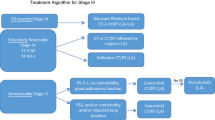Abstract
Objective: To investigate the expression of p120ctn in non-small-cell lung cancer (NSCLC) and its relationship with clinicopathological factors and prognosis. Methods: p120ctn expression was tested by immunohistochemistry for 80 tumors from patients with non-small-cell lung cancer. Correlations were investigated between p120ctn immunostaining in primary tumors and clinicopathological characteristics and survival. Results: Abnormal expression of p120ctn was found in 68/80(85%) tumors in which 43 cases had cytoplasmic staining. Abnormal staining of p120ctn was related with high TNM stage (P=0.003) and nodal metastasis (P=0.024). However, there was no correlation between altered expression with poor differentiation and histological type. According to Kaplan-Meier survival estimate, the expression of p120ctn was related to the poor survival (P=0.015) of patients. A Cox regression analysis revealed that p120ctn expression was a significant independent factor in the prediction of survival for patients with non-small-cell lung cancer (P=0.008). Conclusion: altered expression of p120ctn was found in non-small-cell lung cancers and was correlated with lymph node metastasis and prognosis. From a practical point of view, the expression of p120ctn can be of prognostic value for patients with non-small-cell lung cancer.
Similar content being viewed by others
References
Van Aken E, De Wever O, Correia da Rocha AS, et al. Defective E-cadherin/catenin complexes in human cancer[J]. Virchows Arch 2001; 439: 725.
Mariner DJ, Anastasiadis P, Keilhack H, et al. Identification of Src phosphorylation sites in the catenin p120ctn[J]. J Bio Chem 2001; 276: 28006.
Yang J, Dokurno P, Tonks NK, et al. Crystal structure of the M-fragment of alpha-catenin: implications for medulation of cell adhesion[J]. EMBO J 2001; 20: 3645.
Franceschi S, Bidoli E. The epidemiology of lung cancer[J]. Ann Oncol 1999; 10: 3.
Aho S, Levansuo L, Montonen O, et al. Specific sequences in p120ctn determine subcellular distribution of its multiple isoforms involved in cellular adhesion of normal and malignant epithelial cells[J]. J Cell Sci 2002; 115: 1391.
Reynolds AB, Jenkins NA, Gilbert DJ, et al. The gene encoding p120cas, a novel catenin, localizes on human chromosome 11q11 (CTNND) and mouse chromosome 2 (Catns)[J]. Genomics 1996; 31: 127.
Berx G, Van Roy F. The E-cadherin/catenin complex: an important gatekeeper in breast cancer tumorigenesis and malignant progression[J]. Breast Cancer Res 2001; 3: 289.
Gold JS, Reynolds AB, Rimm DL. Loss of p120ctn in human colorectal cancer predicts metastasis and poor survival[J]. Cancer Lett 1998; 132: 193.
Syrigos KN, Karayiannakis A, Syrigou EI, et al. Abnormal expression of p120 correlates with poor survival in patients with bladder cance[J]. Eur J Cancer 1998; 34: 2037.
Dillon DA, Aquila T, Reynolds AB, et al. The expression of p120ctn protein in breast cancer is independent of alpha- and beta-catenin and E-cadherin[J]. Am J Pathol 1998; 152: 75.
Moon RT, Bowerman B, Boutros M, et al. The promise and perils of Wnt signaling through beta-catenin[J]. Science 2002; 296: 1644.
Chiang JM, Chou YH, Chen TC, et al. Nuclear beat-catenin expression is closely related to ulcerative growth of colorectal carcinoma[J]. Br J Cancer 2002; 86: 1124.
Daniel JM, Ireton RC, Reynolds AB. Monoclonal antibodies to kaiso: a novel transcription factor and p120ctn-binding protein[J]. Hybridoma 2001; 20: 159.
Prokhortchouk A, Hendrich B, Jorgensen H, et al. The p120 catenin partner Kaiso is a DNA methylation-dependent transcriptional repressor[J]. Genes Dev 2001; 15: 1613.
Jawhari AU, Noda M, Pignatellim M, et al. Up-regulated cytoplasmic expression, with reduced membranous distribution, of the Src substrate p120ctn in gastric carcinoma[J]. J Pathol 1999; 189: 180.
Author information
Authors and Affiliations
Corresponding author
Additional information
Foundation items: This work was supported by a grant from the Scientific Research Foundation of the Ministry of Education of PR China (No. 2002-247).
Biography: Zhang Zhi-kun(1982–), male, candidate for Ph.D. degree of pathology, China Medical University, majors in molecular pathology of tumor.
Rights and permissions
About this article
Cite this article
Zhang, Zk., Lin, D., Wang, Eh. et al. Expression of P120ctn in non-small-cell lung cancer: A clinicopathological study. Chin. J. Cancer Res. 14, 274–278 (2002). https://doi.org/10.1007/s11670-002-0060-1
Received:
Accepted:
Issue Date:
DOI: https://doi.org/10.1007/s11670-002-0060-1



